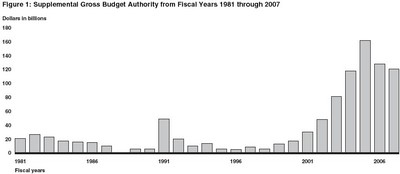GAO Report Highlights Troubling Trend in Supplemental Spending
by Craig Jennings, 3/7/2008
A report recently released by the GAO indicates that with rising rates of supplemental appropriations comes decreasing budgeting transparency. Looking at supplemental requests - emergency and non-emergency - from 1997 to 2006, the report concludes:
To the extent possible, funds should be provided through the regular appropriations process to ensure that trade-offs are made among competing priorities, especially in an environment of increasingly constrained resources. Therefore, controls should be in place to ensure that emergency supplementals are enacted for their intended purpose—to address unforeseen needs that arise suddenly after the start of a fiscal year.
The timeliness of the report is underscored by the trend in supplemental spending seen since 1997.
And while spending on the Global War on Terror (GWOT) since the Sep. 11 attacks accounts for the majority of the funding, other, non-GWOT spending has been on the rise. Compared the period 1987-1996 when some $80 billion in non-war, supplemental spending was enacted, the period 1997-2006 saw $323 billion allocated in supplemental spending acts. And in that same time period all non-emergency totalled $101 billion.
For more on supplementals, see our background brief on supplemental appropriations.




